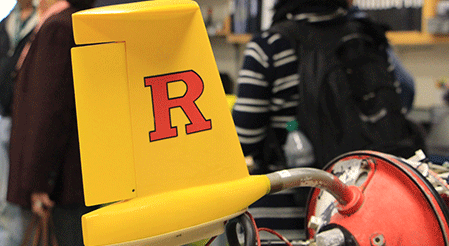RUTGERS–NEWARK
Adam Kustka
Associate Professor, Department of Earth and Environmental Sciences
Rutgers–Newark College of Arts and Sciences
Adam Kustka’s research focuses on the physiology and ecology of phytoplankton which collectively serve as the cornerstone of most coastal and open ocean marine ecosystems and a major driver of global climate.
RUTGERS–NEW BRUNSWICK
Malin Pinsky
Assistant Professor, Department of Ecology, Evolution, and Natural Resources
School of Environmental and Biological Sciences
Malin Pinksy’s research addresses global change in the ocean. He is particularly interested in the mechanisms that determine population and community responses to global change, the consequences for human society, and the approaches that can foster sustainable management.
Daphne Munroe
Assistant Professor, Department of Marine and Coastal Sciences
School of Environmental and Biological Sciences
Daphne Munroe’s research is focused on increasing pressures on marine ecosystems, including climate change, resource exploitation, ocean acidification, and pollution which threaten to create imbalances that will drive ecological change in the ocean.
Oscar Schofeld
Professor, Department of Marine and Coastal Sciences
School of Environmental and Biological Sciences
Oscar Schofield has worked throughout the world to better understand how the ocean drives the Earth’s climate and chemistry to support productive ecosystems of unprecedented diversity. His motivation is based on, that despite centuries of exploration of the oceans they remain relatively unexplored with many of the most basic and fundamental questions unanswered. His efforts have spanned developing remote sensing algorithms to map biological patterns in the ocean from space, using the world’s first science electro-optical seafloor to study coastal biogeochemistry, to the design of new biological sensors and development of new undersea robotic systems. These technologies are resulting in the deployment of ocean observing networks throughout the world, which represents the largest investments in ocean science infrastructure this century and he has been, and is, central to ongoing efforts of the United States Navy, National Science Foundation, NASA, and NOAA.
Research Centers and Institutes

Rutgers University Center of Ocean Observing Leadership
The Rutgers University Center of Ocean Observing Leadership (RU COOL) integrates across interdisciplinary scientific research, education and outreach using an operational ocean observing system.

Rutgers Institute of Earth, Ocean, and Atmospheric Sciences
The Rutgers Institute of Earth, Ocean, and Atmospheric Sciences advances research, education, and engagement that (1) progresses and expands the scientific understanding of the past, present, and future of the Earth system and (2) builds the knowledge and perspective needed for state, national, and global stewardship of a healthy, sustainable, and resilient planetary environment.
